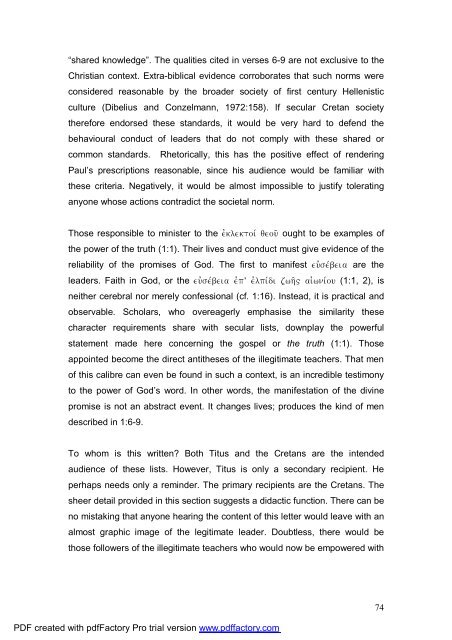A Text centred rhetorical analysis of Paul's Letter to Titus
A Text centred rhetorical analysis of Paul's Letter to Titus
A Text centred rhetorical analysis of Paul's Letter to Titus
Create successful ePaper yourself
Turn your PDF publications into a flip-book with our unique Google optimized e-Paper software.
“shared knowledge”. The qualities cited in verses 6-9 are not exclusive <strong>to</strong> the<br />
Christian context. Extra-biblical evidence corroborates that such norms were<br />
considered reasonable by the broader society <strong>of</strong> first century Hellenistic<br />
culture (Dibelius and Conzelmann, 1972:158). If secular Cretan society<br />
therefore endorsed these standards, it would be very hard <strong>to</strong> defend the<br />
behavioural conduct <strong>of</strong> leaders that do not comply with these shared or<br />
common standards. Rhe<strong>to</strong>rically, this has the positive effect <strong>of</strong> rendering<br />
Paul’s prescriptions reasonable, since his audience would be familiar with<br />
these criteria. Negatively, it would be almost impossible <strong>to</strong> justify <strong>to</strong>lerating<br />
anyone whose actions contradict the societal norm.<br />
Those responsible <strong>to</strong> minister <strong>to</strong> the ejklek<strong>to</strong>iv qeou' ought <strong>to</strong> be examples <strong>of</strong><br />
the power <strong>of</strong> the truth (1:1). Their lives and conduct must give evidence <strong>of</strong> the<br />
reliability <strong>of</strong> the promises <strong>of</strong> God. The first <strong>to</strong> manifest eujsevbeia are the<br />
leaders. Faith in God, or the eujsevbeia ejpÆ ejlpivdi zwh`" aijwnivou (1:1, 2), is<br />
neither cerebral nor merely confessional (cf. 1:16). Instead, it is practical and<br />
observable. Scholars, who overeagerly emphasise the similarity these<br />
character requirements share with secular lists, downplay the powerful<br />
statement made here concerning the gospel or the truth (1:1). Those<br />
appointed become the direct antitheses <strong>of</strong> the illegitimate teachers. That men<br />
<strong>of</strong> this calibre can even be found in such a context, is an incredible testimony<br />
<strong>to</strong> the power <strong>of</strong> God’s word. In other words, the manifestation <strong>of</strong> the divine<br />
promise is not an abstract event. It changes lives; produces the kind <strong>of</strong> men<br />
described in 1:6-9.<br />
To whom is this written? Both <strong>Titus</strong> and the Cretans are the intended<br />
audience <strong>of</strong> these lists. However, <strong>Titus</strong> is only a secondary recipient. He<br />
perhaps needs only a reminder. The primary recipients are the Cretans. The<br />
sheer detail provided in this section suggests a didactic function. There can be<br />
no mistaking that anyone hearing the content <strong>of</strong> this letter would leave with an<br />
almost graphic image <strong>of</strong> the legitimate leader. Doubtless, there would be<br />
those followers <strong>of</strong> the illegitimate teachers who would now be empowered with<br />
PDF created with pdfFac<strong>to</strong>ry Pro trial version www.pdffac<strong>to</strong>ry.com<br />
74

















